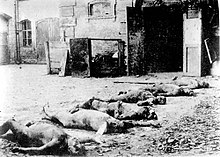Europe
|
See also: Capital punishment in Belarus |

In Belarus, executions are performed by a single executioner shooting the condemned through the brain from behind with a suppressed pistol.[5]
Execution by shooting is a method of capital punishment in which a person is shot to death by one or more firearms. It is the most common method of execution worldwide, used in about 70 countries,[1] with execution by firing squad being one particular form.
In most countries, execution by a firing squad has historically been considered a more honorable death and was used primarily for military personnel, though in some countries—among them Belarus, the only state in Europe today that has the death penalty—the single executioner shooting inherited from the Soviet past is still in use.
|
See also: Capital punishment in Brazil |
Although Brazil abolished capital punishment in peacetime, it can be used for certain crimes in wartime, such as betrayal, conspiracy, mutiny, unauthorised retreat in battles, and theft of equipment or supplies in a military base.[2][3] The execution method in this case is execution by shooting.[2][4]
|
See also: Capital punishment in Belarus |

In Belarus, executions are performed by a single executioner shooting the condemned through the brain from behind with a suppressed pistol.[5]
|
See also: Capital punishment in the Soviet Union |

In 20th-century communist states, shooting was a standard form of execution of civilian and military prisoners alike, with the Soviet Union setting an example of the single-executioner approach. The firing squad, with its solemn and lengthy ceremony was used infrequently.
The most common method was the firing of a pistol bullet ("nine grams of lead") into the brain.
This method was widely used during the Great Purges of the late 1930s at locations outside the major cities, e.g. Krasny Bor near Petrozavodsk, against purportedly anti-social elements, "counter-revolutionaries" and other enemies of the people.
It was also used in the execution of those who had committed ordinary criminal offences. Even after the breakup of the Soviet Union, people continued to be executed by shooting. Serial killer Andrei Chikatilo was executed in this way in 1994, just before Russia discontinued capital punishment as part of its accession to the Council of Europe.
|
See also: Capital punishment in the United Kingdom |
No British citizen has ever been executed for a civilian crime by shooting by the British Crown Judiciary. Execution by firing squad has been a strictly military punishment. A Royal Commission on Capital Punishment considered shooting as a possible alternative to hanging, although the findings published in 1953 concluded shooting was not a sufficiently effective means of execution to justify a switch to the method from hanging.
|
See also: Capital punishment in the USA |
Since 1608, about 142 men have been judicially shot in the United States and its English-speaking predecessor territories, excluding executions related to the American Civil War.[6] During the American Civil War, 433 of the 573 men executed were shot dead by a firing squad: 186 of the 267 executed by the Union Army, and 247 of the 306 executed by the Confederate Army.
Today, execution by shooting is allowed in the US states of Idaho, Oklahoma, South Carolina and Utah.
